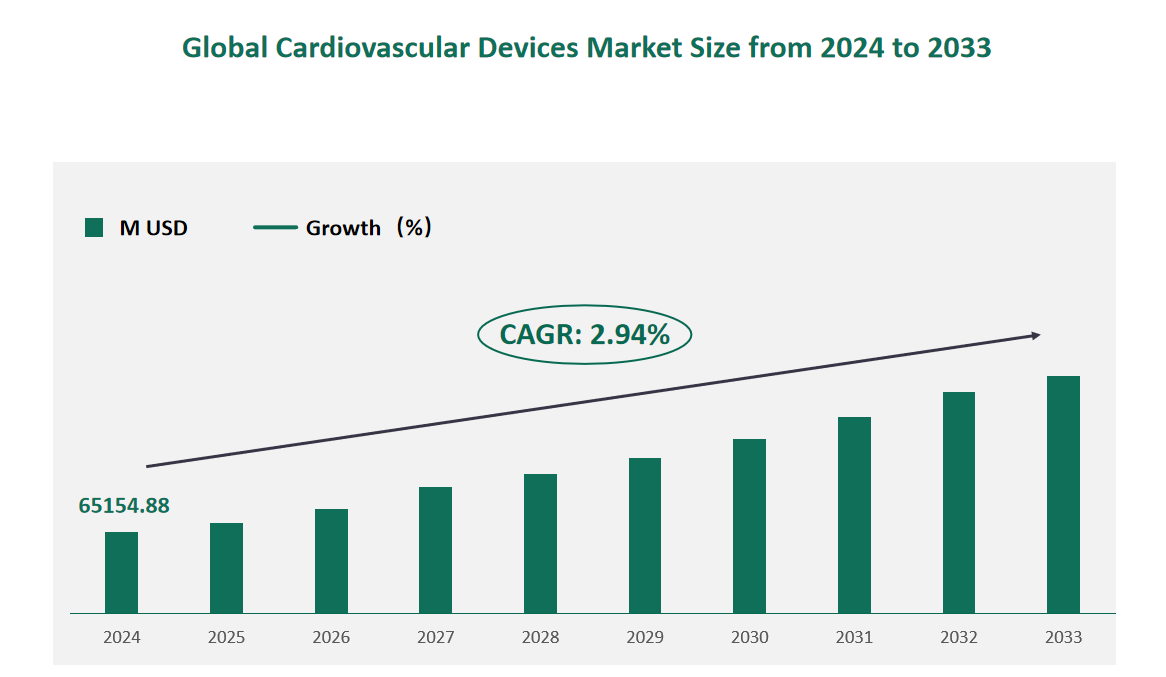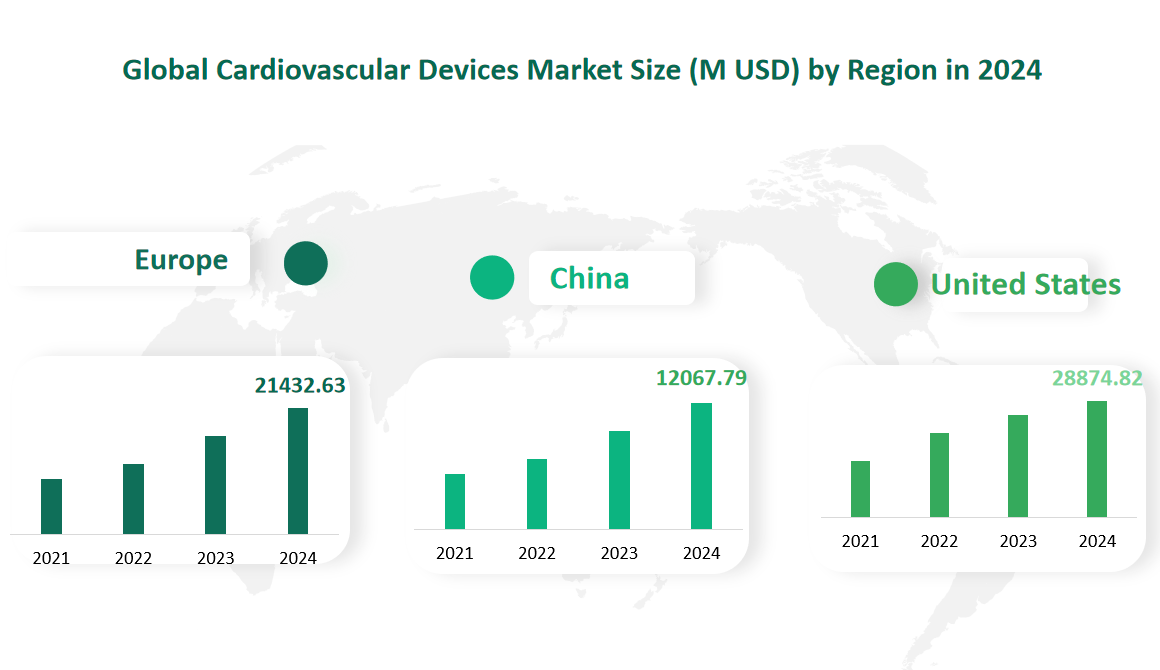1 Global Cardiovascular Devices Market Size (Value) and CAGR (2024-2033)
In 2024, the global Cardiovascular Devices market was valued at USD 65154.88 million, with a CAGR of 2.94% from 2024 to 2033.
The dynamic electrocardiograph records the whole process of the patient’s electrocardiographic activity for 24 hours or more in the daily life of the patient, and analyzes and processes it with the help of a computer to find arrhythmia and myocardial ischemia that are not easily found during routine surface electrocardiogram examination Etc., to provide an important objective basis for clinical diagnosis, treatment and judgment of efficacy.
Figure Global Cardiovascular Devices Market Size (M USD) and CAGR 2024-2033

2 Cardiovascular Devices Market Drivers
Increasing Prevalence of Cardiovascular Diseases: The rising incidence of heart diseases, driven by factors such as aging populations, sedentary lifestyles, and unhealthy eating habits, is a significant driver. As more people suffer from conditions like hypertension, coronary artery disease, and heart failure, the demand for diagnostic and therapeutic cardiovascular devices increases.
Technological Advancements: Innovations in medical technology are continuously improving the effectiveness and efficiency of cardiovascular devices. For example, the development of minimally invasive surgical tools, advanced imaging technologies, and smart monitoring devices is enhancing patient outcomes and expanding market opportunities.
Growing Geriatric Population: The global increase in the elderly population is a major driver, as older individuals are more susceptible to cardiovascular diseases. This demographic shift is driving the demand for both diagnostic and therapeutic devices, as well as long-term monitoring solutions.
Healthcare Reform and Increased Awareness: Governments and healthcare organizations worldwide are focusing on improving healthcare infrastructure and expanding access to medical services. Increased awareness about cardiovascular health and the availability of advanced treatments is encouraging more people to seek medical intervention, thereby boosting the market.
3 Cardiovascular Devices Market Restraints
High Equipment Maintenance Costs: The sophisticated nature of cardiovascular devices often requires specialized maintenance and calibration. These high maintenance costs can be a barrier for smaller healthcare facilities and emerging markets, limiting the widespread adoption of advanced devices.
Stringent Regulatory Requirements: The cardiovascular devices market is highly regulated due to the critical nature of the products. Stringent approval processes and compliance requirements can delay the introduction of new devices and increase costs for manufacturers. This regulatory burden can slow down innovation and market expansion.
Unfavorable Trading Environment: The international trade dynamics, including tariffs and trade barriers, can impact the global supply chain of cardiovascular devices. For example, the U.S.-China trade tensions have affected the import and export of medical devices, limiting market access and increasing costs.
4 Global Cardiovascular Devices Market Size by Type in 2024
Diagnostic and Monitoring Devices are essential tools used in the early detection and ongoing management of cardiovascular diseases. These devices include electrocardiograms (ECGs), echocardiography machines, Holter monitors, event monitors, PET scans, MRI scans, and cardiac CTs. These technologies are critical for identifying arrhythmias, myocardial ischemia, and other heart conditions that may not be apparent during routine examinations.
In 2024, the market value for Diagnostic and Monitoring Devices is forecasted to reach $8,051.76 million. This segment represents approximately 12.36% of the total Cardiovascular Devices market. The growth in this segment is driven by increasing awareness of cardiovascular diseases and the need for early diagnosis to improve patient outcomes. Additionally, advancements in technology have made these devices more accessible and accurate, further boosting their adoption in healthcare settings.
Therapeutic and Surgical Devices are used in the treatment and management of cardiovascular conditions. This category includes pacemakers, stents, catheters, guide wires, electrosurgical procedures, heart valves, and occlusion devices. These devices are essential for interventional procedures and long-term management of heart diseases.
In 2024, the market value for Therapeutic and Surgical Devices is projected to be $57,103.12 million, accounting for approximately 87.64% of the total Cardiovascular Devices market. The dominance of this segment is attributed to the increasing prevalence of cardiovascular diseases and the growing demand for effective treatment options. The development of minimally invasive surgical techniques and advanced materials has also contributed to the growth of this segment. For instance, the use of drug-eluting stents and transcatheter heart valves has revolutionized the treatment of coronary artery disease and valvular heart disease, respectively.
Table Global Cardiovascular Devices Market Size by Type in 2024
Type | Market Size (M USD) 2024 |
Diagnostic and Monitoring Devices | 8051.76 |
Therapeutic and Surgical Devices | 57103.12 |
5 Global Cardiovascular Devices Market Size by Application in 2024
In the medical care segment, the market value is forecasted to be $16,950.36 million, accounting for approximately 26.01% of the total market. This segment includes routine check-ups, diagnosis, and ongoing patient management. Devices such as portable ECGs, Holter monitors, and other diagnostic tools are widely used in medical care facilities to facilitate early detection and monitoring of cardiovascular conditions. The growth in this segment is driven by increasing awareness of heart health and the need for accessible diagnostic services.
The hospital segment dominates the market, with a projected value of $46,770.25 million in 2024, representing 71.79% of the total market. Hospitals are the primary setting for the use of therapeutic and surgical cardiovascular devices. These include pacemakers, stents, catheters, and other interventional tools used in surgeries and emergency treatments. Hospitals also utilize advanced diagnostic equipment such as MRI scans and cardiac CTs.
The laboratory segment, while smaller, is also significant, with a market value of $1,434.27 million in 2024, accounting for 2.20% of the total market. Laboratories play a crucial role in the diagnosis and research of cardiovascular diseases. Devices used in laboratories include advanced imaging systems and diagnostic tools that support detailed analysis and research. The growth in this segment is driven by advancements in medical technology and the increasing need for precise diagnostic tools.
Table Global Cardiovascular Devices Market Size by Application in 2024
Application | Market Size (M USD) 2024 |
Medical Care | 16950.36 |
Hospital | 46770.25 |
Laboratory | 1434.27 |
6 Global Cardiovascular Devices Market Size by Region in 2024
In the United States, the market value is projected to reach $28874.82 million in 2024. The U.S. is a leader in the cardiovascular devices industry, driven by a robust healthcare infrastructure, significant investment in research and development, and a high prevalence of cardiovascular diseases. The country’s strong focus on innovation and advanced medical technologies has positioned it as a hub for the development and adoption of cutting-edge cardiovascular devices.
Europe follows closely, with a projected market value of $21432.63 million in 2024. The European market is characterized by a high demand for minimally invasive procedures and advanced diagnostic tools. The region benefits from a well-established healthcare system and a strong focus on patient care and outcomes. European countries have a high prevalence of cardiovascular diseases, which has driven the need for effective diagnostic and therapeutic solutions. The presence of major players and a strong regulatory framework have also contributed to the region’s growth.
China is emerging as a significant player in the global Cardiovascular Devices market, with a projected value of $12067.79 million in 2024. China’s rapid economic growth, increasing disposable income, and rising awareness of cardiovascular diseases have driven the demand for advanced cardiovascular devices. The country’s large population and growing healthcare infrastructure have created a significant market opportunity for both domestic and international players. The Chinese government’s focus on improving healthcare services and increasing investment in medical research and development has further boosted the market.
Figure Global Cardiovascular Devices Market Size by Region in 2024

7 Major Players in Global Cardiovascular Devices Market
7.1 Medtronic
Company Profile: Medtronic, PLC is a global leader in medical technology, founded in 1949 and headquartered in Dublin, Ireland. The company operates worldwide and has a diverse portfolio of products designed to address a wide range of medical conditions, including cardiovascular diseases. Medtronic’s principal products include those for bradycardia pacing, tachyarrhythmia management, atrial fibrillation management, heart failure management, heart valve replacement, and other therapeutic solutions.
Business Overview: Medtronic is known for its innovative and minimally invasive medical devices. The company’s products are used in various medical procedures, from routine diagnostics to complex surgeries. Medtronic’s strong focus on research and development has enabled it to maintain a competitive edge in the market. The company collaborates with healthcare providers, researchers, and patients to develop solutions that improve patient outcomes and enhance the quality of life.
Product Introduction: One of Medtronic’s flagship products is the ENDURANT II STENT GRAFT SYSTEMS, which is used for the treatment of abdominal aortic aneurysms (AAA). This system has a legacy of clinical success and is designed to treat both straightforward and challenging anatomies. Medtronic’s products are widely recognized for their reliability and effectiveness in cardiovascular care.
Recent Financial Data: In the most recent fiscal year, Medtronic reported a production value of $11,819.38 million, with a gross margin of 39.47%.
7.2 Abbott Laboratories
Company Profile: Abbott Laboratories, founded in 1888, is a global healthcare company with a diverse portfolio of products and services. The company is headquartered in Abbott Park, Illinois, USA, and operates worldwide. Abbott’s product lines include pharmaceuticals, nutritional products, diagnostics, and vascular products, with a significant focus on cardiovascular devices.
Business Overview: Abbott Laboratories is known for its commitment to improving health through innovative products and technologies. The company’s cardiovascular division offers a wide range of products, including pacemakers, stents, and diagnostic tools. Abbott’s strong research and development capabilities have enabled it to introduce groundbreaking products that address critical healthcare needs.
Product Introduction: Abbott’s SHAPING THE FUTURE pacemaker is an example of its innovative approach to cardiovascular care. This pacemaker offers exceptional longevity in a small device size, with a physiologic physician-preferred shape that enables a smaller incision and pocket size. Abbott’s products are designed to provide effective solutions for patients with cardiovascular conditions.
Recent Financial Data: In the most recent fiscal year, Abbott Laboratories reported a production value of $9,098.37 million, with a gross margin of 37.14%.
7.3 Boston Scientific
Company Profile: Boston Scientific Corporation, founded in 1979, is a global developer, manufacturer, and marketer of minimally invasive medical devices. The company is headquartered in Marlborough, Massachusetts, USA, and operates worldwide. Boston Scientific’s products are used in various medical specialties, including interventional cardiology, cardiac rhythm management, peripheral interventions, electrophysiology, neurovascular intervention, endoscopy, urology, gynecology, and neuromodulation.
Business Overview: Boston Scientific is dedicated to transforming lives through innovative medical solutions. The company’s focus on minimally invasive technologies has positioned it as a leader in the cardiovascular devices market. Boston Scientific collaborates with healthcare providers and researchers to develop products that improve patient outcomes and enhance the quality of care.
Product Introduction: One of Boston Scientific’s notable products is the Amplatz Super Stiff™ Guidewire, which provides extra strength and stability during catheter placement and exchange. This product is designed to support complex procedures and improve procedural efficiency. Boston Scientific’s commitment to innovation is evident in its wide range of cardiovascular devices.
Recent Financial Data: In the most recent fiscal year, Boston Scientific reported a production value of $6,669.77 million, with a gross margin of 37.38%.

